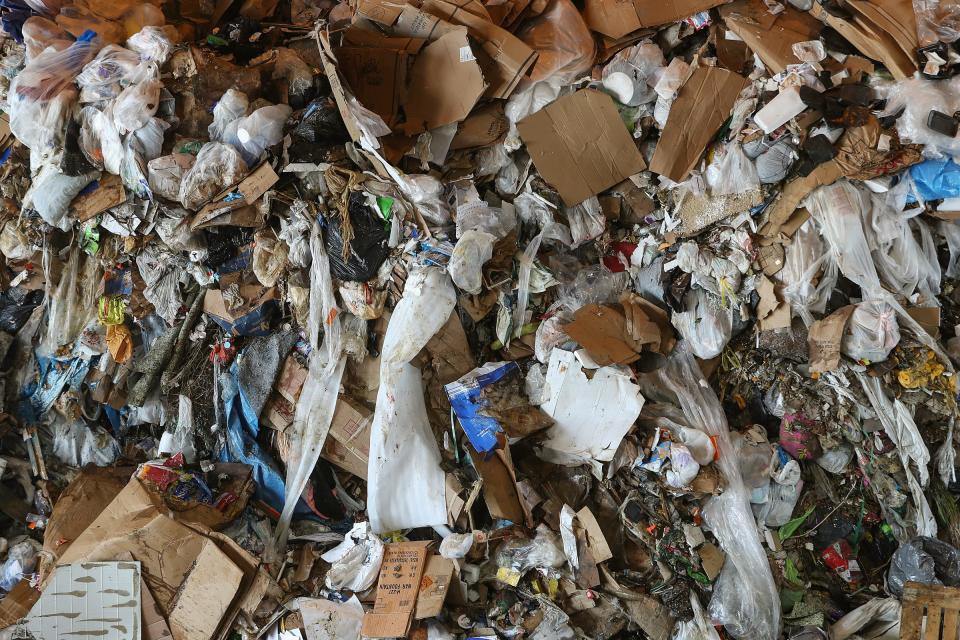Scrub Hub: How can Hoosiers help reduce the amount of waste they generate?
Reduce, Reuse, Recycle. That has been a popular mantra for Hoosiers wanting to be better stewards of the environment, but the primary focus for most people has been on recycling.
The push toward the "Three Rs" started in the 1970s with the birth of Earth Day and gained popularity with eco-conscious citizens. For most people, recycling was the most viable option for individuals and families wanting to do their part.
Recycling topics are, indeed, one of the most popular questions Hoosiers submit on our Scrub Hub form. But studies show we need to look beyond recycling. Today’s level of waste generation is unsustainable, so for this edition of Scrub Hub we're looking at another of the "Three Rs:" Reduce.
We spoke with an expert within the sustainability world to answer: How can Hoosiers help reduce the amount of waste they generation?
The Answer: Shift the Three Rs emphasis to 'Reduce'
The U.S. EPA developed a hierarchy for waste management, and it mimics the Three Rs so heavily taught since the ‘70s. The most preferred actions are waste reduction and reuse, and the agency says this is the “most environmentally preferred strategy.”
Recycling is still an important action but is focused on dealing with existing waste. So how can we shift to eliminating as much of that waste as possible on the front end — before it ever reaches our homes?
Michaela Barnett led a study published last summer in Nature Sustainability about the overemphasis on recycling and a neglect of waste reduction. Barnett now owns and operates a zero-waste store in Knoxville called KnoxFill.
The study questioned participants about the systems of waste management, and Barnett said people know the best action should be taken upstream during the design and production phases. But when asked what they could do to help mitigate the waste problem, most say it's only through their own consumption and disposal behaviors. And recycling often is the easiest option.
“This is the one I keep thinking about: How we can start getting people to not only think upstream but act upstream in a way that can change these systems at scale?” Barnett said.

A tricky part of this is that environmental protection has largely been left to individuals, Barnett said, which tends to leave people viewing their roles as consumers — and not citizens who have the capacity to bring change with their voices, wallets and votes.
“We’re not just consumers, we get to be active participants,” Barnett said. “That reframing can be really powerful in the systems we advocate for.”
One of the better ways to use that energy and power is to write letters to local lawmakers, Barnett said.
There's also room for personal behavior changes that can help shift the focus onto reducing consumption. These might involve lending and borrowing tools from neighbors rather than heading out and buying brand new ones. The study also suggests buying second-hand goods and reusing what you can.
The creation of new products emits greenhouse gases that contribute to climate change, extract limited raw materials from the Earth, and consume energy for manufacturing and transportation. Refocusing attention to reduction and reuse helps eliminate some of these environmental concerns.
Previously on Scrub Hub: What is a green burial? (Yes, it involves decomposing into the earth)
You also should look for products with minimal packaging or that are offered in environmentally friendly materials.
On the public policy advocacy front, Barnett said people can ask lawmakers to adopt "Extended Producer Responsibility" laws that shift the onus of dealing with the waste from the consumer to the manufacturer. Some lawmakers, according to the National Conference of State Legislatures, have shown a growing interest in these laws by addressing products such as electronics, batteries and mattresses.
While extremes swing from individual actions such as reuse and recycling to placing the responsibility entirely on the systems and manufacturers, Barnett said the best answer is somewhere in the middle.
“I think a big part of it is actually reframing who we are," Barnett said, "and taking back some of our power in this world that has had a little bit of a pendulum shift.”
Karl Schneider is an IndyStar environment reporter. You can reach him at karl.schneider@indystar.com. Follow him on Twitter @karlstartswithk
IndyStar's environmental reporting project is made possible through the generous support of the nonprofit Nina Mason Pulliam Charitable Trust.
This article originally appeared on Indianapolis Star: Scrub Hub: We must move beyond recycling to focus on waste reduction

